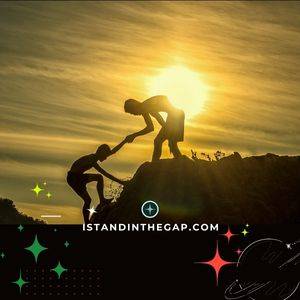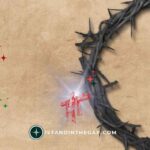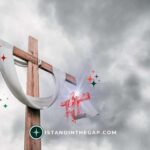Ever thought of the phrase ‘stand in the gap’? Ezekiel 22:30 is a phrase used to urge people to take responsibility.
In this article, we will uncover the real meaning of the phrase “standing in the gap,” and learn the hardships and rewards of doing so. Plus, how to use it for a positive impact in life and community.
Key Takeaways:
- Standing in the gap is a biblical metaphor for interceding on behalf of others. The wall with a gap represents a breach in protection that needs to be filled by someone willing to stand in the gap to provide protection.
- In Ezekiel 22, Israel is punished for their sins and abuses, and the prophet calls for someone to stand in the gap to intercede on behalf of the people. Failure to find someone willing to stand in the gap results in God’s wrath.
- Moses is a prime example of someone who stood in the gap for his people. In Exodus 32, he intercedes on behalf of the Israelites and pleads for God’s mercy. His actions are praised in Psalm 106:23.
- Interceding for others is an important aspect of prayer, as seen in the examples of other biblical figures such as Abraham, Job, and Jesus. Prayer allows us to stand in the gap for others and be a conduit for God’s mercy and grace.
Anchor verse
So I sought for a man among them who would make a wall, and STAND IN THE GAP before Me on behalf of the land, that I should not destroy it; but I found no one.
Ezekiel 22:30 (NKJV)
Understanding the Biblical Metaphor of Standing in the Gap
What is the meaning of Stand in the Gap
Ezekiel 22:30 is a powerful verse in the Bible that speaks about standing in the gap. It refers to a protective wall that surrounds a city, which has a breach or a hole in it. The result is that the city is vulnerable to attacks, punishment, and destruction.
However, if someone stands in the gap and acts as a defender, interceding on behalf of the people and seeking protection, the city can be saved from its impending doom.
The metaphor of standing in the gap is a call to action for believers to intercede on behalf of their nation, community, and the world at large. It means that we are called to be defenders of righteousness in a world of sin and abuse.
By standing in the gap, we become a shield of protection against the wrath and judgment of God, which will come upon people who refuse to repent of their sins.
To stand in the gap requires courage, insight, and a deep understanding of God’s sovereignty. It means being willing to pray, fast, and seek God’s face on behalf of our friends, family, and even people, groups, and nations. It means being willing to be a voice for truth and speak out against false prophets who lead people astray from the Lord Jesus.
Ultimately, standing in the gap means surrendering ourselves to God’s will and trusting that He will accomplish His plan and purpose for our lives and the world around us.
As believers, we can take inspiration from various biblical characters who stood in the gap. Abraham interceded for Sodom, and Stephen and Paul prayed for the salvation of their persecutors. Moses stood in the gap for the Israelites after they made a golden calf in the wilderness, pleading with God for mercy.
By following their example, we too can make a difference in the world by standing in the gap and being defenders of truth and righteousness.
What is the Wall with a Gap?
The Wall with a Gap refers to the metaphor used in the Bible, specifically in Ezekiel 22:30, where God is seeking someone to stand in the gap on behalf of His people. It means being a mediator between God and humanity by interceding for them through prayer and action.
The gap signifies a breach or a hole in something that is supposed to be whole or complete. In this context, it represents the brokenness caused by sin and the separation between God and humans.
The wall can represent protection or security, but the gap suggests vulnerability and lack of defense against the enemy’s attacks.
God is looking for someone to stand in the gap because He wants to spare His people from destruction.
Psalm 106:23, says that Moses stood in the gap to turn away God’s wrath from Israel when they sinned by making a golden calf. Similarly, we are called to stand in the gap not only for ourselves but also for others who are lost or oppressed.
Standing in the gap requires commitment, sacrifice, and humility. We must be willing to identify with others’ pain and take action to meet their needs while also addressing the root cause of their problems. It means going beyond personal comfort or convenience and stepping out of our comfort zone to engage with those who might otherwise be ignored or rejected.
The Wall with a Gap is not just a concept but an urgent call to action for every believer who desires to see God’s kingdom come on earth as it is in heaven. We cannot afford to sit back and watch as darkness creeps over our communities and nations; we must rise up as agents of change who bring hope, healing, and restoration wherever we go.
Are you ready to stand in the gap? Don’t miss out on this opportunity to make a difference and fulfill your purpose as a child of God. Let us pray that God will raise up more individuals who are willing to destroy every wall of division and injustice and bring light to the darkest corners of our world.
Importance of the Wall as a Means of Protection in Ancient Times
The importance of the wall as a means of protection in ancient times cannot be overemphasized.
Walls were built around cities and settlements to provide a physical barrier that protected the residents from attacks by their enemies. These walls were made using different materials, including stones, bricks, and wood, depending on the resources available.
The height and thickness of the walls varied based on the level of threat posed by potential attackers.

For instance, cities located near hostile territories had thicker and higher walls than those located in peaceful regions. The construction of walls was a vital aspect of city planning, as failure to build sturdy walls could lead to devastating consequences.
Walls also served other strategic purposes, including restricting movement in and out of a city or settlement. Controlled access points, such as gates, were situated at specific locations along the wall to regulate entry and exit into the city.
This controlled access helped prevent unauthorized individuals from entering, which would have compromised security.
Furthermore, in some biblical stories like Exodus 32:9-14, walls served as barriers between God’s people and their enemies. The people often turned away from God’s commandments, leading Him to consider wiping them out entirely.
However, Moses interceded on their behalf by “standing in the gap” between God’s wrath and his people’s sins.
In modern times, we can learn a lesson from these ancient wall-building practices by building metaphorical walls around our hearts to protect ourselves from negativity and harmful influences.
Just like ancient civilizations had to take steps to protect their cities physically, we must take steps toward protecting our mental well-being by setting boundaries that keep us safe from toxic people or thought processes.
One prime example is creating a boundary around social media usage when it becomes overwhelming or negative, limiting exposure to fear-based news, or engaging in activities that boost your mental health such as exercise during stressful periods.
Therefore understanding how crucial building metaphoric barriers that provide safety can have an impact on one’s well-being.
As seen through the Bible, believing in something higher and standing for what is right can provide safety in a time of uncertainty.
The Context of Ezekiel 22
By “The Context of Ezekiel 22,” I am referring to a passage in the book of Ezekiel in the Bible. Specifically, it refers to a verse in Ezekiel 22:30 that mentions “standing in the gap.”
This phrase is often used in Christian circles to describe the act of intercession – that is, standing in prayer on behalf of others who need spiritual help.
To understand what it means to stand in the gap, we first need to look at the context of Ezekiel 22.
This chapter is a list of accusations against the Israelites for their various sins – such as shedding blood, idolatry, and neglect of the poor. God is angry with his people for their wrongdoing and threatens to punish them severely.
However, in verse 30, there is a glimmer of hope. God says, “I looked for someone among them who would build up the wall and stand before me in the gap on behalf of the land so I would not have to destroy it, but I found no one.”
So, what does it mean to stand in the gap in this essence?
Essentially, it means to intervene on behalf of others who are in trouble, need help, or are at risk of harm. In the context of Ezekiel 22, God is looking for someone to intercede on behalf of the Israelites, to pray for their forgiveness and protection.
This idea of standing in the gap can be applied to many situations in life – from praying for a friend who is struggling with addiction, to praying and fasting for a broken family, to advocating for social justice issues.
As Christians, we are called to be intercessors – to stand in the gap for those who need our prayers and support.
This can be a daunting task, but there are some practical steps we can take to help us in this calling.
- First, we can ask God to give us the strength and guidance we need to pray effectively.
- Second, we can educate ourselves on the issues we are praying about so that we can pray with knowledge and understanding.
- Finally, we can join with others in prayer and action, knowing that we are stronger together.
Summary of Israel’s Sins and Abuses
Israel’s sins and abuses are listed in great detail in Ezekiel 22. The chapter begins with a description of Jerusalem as a city that is full of corruption, violence, and injustice.
The leaders and the people are guilty of shedding blood, oppressing the poor and needy, disregarding God’s laws, and defiling the temple with their idolatry.
The prophet Ezekiel addresses the elders of Israel and confronts them about their sins. He accuses them of using their positions of authority to exploit the weak and vulnerable instead of protecting them. He calls out their greed, dishonesty, and lack of compassion for those who suffer.
Ezekiel also points out the false prophets who claim to speak for God but are only interested in gaining personal profit. They deceive the people with their lies and reinforce their sinful behavior instead of leading them to repentance. This throws light on all false prophets and what awaits them.
The summary of Israel’s sins and abuses ultimately exposes how far they have drifted away from God’s covenant relationship with them. They have chosen to ignore His laws and worship other gods.
A similar scenario happened in a church where a group of leaders abused their power by manipulating members’ finances for personal gains. They overlooked any wrongdoing within themselves while pointing fingers at others who were trying to address these issues. When confronted with undeniable evidence, they refused to take responsibility or show remorse. This caused confusion among the congregation and led many away from the church. This has become so rampant in some churches.
Punishment for Israel’s Sins: God’s Wrath
God’s wrath was incurred by the people of Israel due to their disobedience and sinfulness.
In Ezekiel 22:30, God states that he sought someone who would stand in the gap on behalf of the land, but found none. This shows how much God desired for his people to repent and turn away from their wicked ways.
The punishment for Israel’s sins was severe, as demonstrated throughout the book of Ezekiel. The people had turned away from God and were engaging in all manner of idolatry, immoral behavior, and disregard for His laws. God’s anger was ignited because they had abandoned their covenant with him and were living according to pagan customs.
The consequences of this rebellion were horrific; Jerusalem was destroyed, the temple was desecrated, and countless lives were lost or displaced. These events served as a warning to other nations about what would happen if they too turned away from God.
Despite this harsh punishment, there was still hope for reconciliation with God. Throughout Ezekiel’s prophecies, he calls on the people to repent of their sins and return to obedience to God’s laws. If they did so, then they could avoid the judgment that He had promised them.
We can learn from Israel’s mistakes and apply it to our own lives today. We must strive to remain faithful to God in all things and turn away from any sinful behavior that may separate us from Him.
By standing firm in our faith and seeking out opportunities to share His love with others, we can help bridge any gaps that may exist between us and those who have not yet come to know Him.
To do so effectively:
- We need to cultivate humility in our hearts towards those who don’t believe as we do. Showing understanding and expressing concern when talking with others is crucial when trying to help them understand our faith better.
- We should also pray regularly for those who do not know Christ so that they may be awakened by His love and light.
- Ultimately, it is by God’s grace that we are saved, and it is only through Him that we can stand in any gap that exists.
Moses and Standing in the Gap
The concept of standing in the gap can be traced back to the Bible verse Ezekiel 22:30 where God is seeking someone who could stand in the gap, intercede and make up the hedge for His people so that He does not have to destroy them.
This means that God is looking for someone who can act on behalf of His people, stand in the gap and make a difference.
In the Bible, Moses was an advocate for the Israelites when he stood in the gap on their behalf and pleaded with God for their forgiveness.
Standing in the gap means being a mediator between God and other people. It involves intercessory prayer and taking action to help others. One can stand in the gap for individuals, families, communities, or nations. It allows God’s mercy and grace to shine through and bring redemption to those in need.
It is important to note that standing in the gap is not just about praying for others, but also being willing to take action to help them. This action could be volunteering, donating, mentoring, or advocating for them. It is an act of selflessness and love towards others, reflecting God’s heart for humanity.
Moses’ Intercession in Exodus 32:9-14
Moses’ intercession was not just a one-time event. He continued to stand in the gap between God and the people of Israel throughout his life. This act of selflessness showed how much he cared for his people and was willing to put himself in harm’s way to protect them.
Standing in the gap means being an advocate or mediator for someone else. This involves putting oneself in a position of vulnerability to help those who cannot help themselves. When Moses stood before God on behalf of the Israelites, he was standing in the gap between judgment and mercy.
Lessons we can learn from Moses’ intercession are:
- Leaders should always be willing to stand up for their people. When leaders see their followers doing wrong, they must not turn a blind eye but instead take responsibility for them as individuals and help guide them back onto the right path.
- Another takeaway from this story is that standing in the gap requires bravery and humility. Moses had to face God directly knowing what God had said about destroying His own people who had betrayed Him multiple times. But through it all, he remained humble by acknowledging his place as a mediator between God and man.
- If you want to stand in the gap for someone else, you need to approach it with both respect for their dignity and also care with making sure they are held accountable for their actions while still offering mercy when appropriate.
Overall, it requires sacrifice, selflessness, bravery, humility, care, respect, and accountability towards each other – which constitutes a healthy relationship between individuals!
Importance of Moses’ Actions in Psalm 106:23
The Importance of Moses’ Actions in Psalm 106:23 lies in the fact that he stood in the gap before God for his people.
The psalm narrates the history of Israel and talks about their disobedience towards God, but it also highlights some individuals who pleased Him, and one such person was Moses.
Moses is depicted as a mediator who interceded for his people even when they were unfaithful to God. In verse 23 of Psalm 106, it is stated that “Therefore he said he would destroy them, had not Moses, his chosen one, stood in the gap before him, to turn away his wrath from destroying them.” This shows how important Moses’ actions were in preventing God’s punishment of the Israelites.
The act of standing in the gap involves being an intermediary between God and His people. It requires being selfless and placing oneself at risk for the sake of others. This is what Moses did when he pleaded with God on behalf of the Israelites even though they had rebelled against Him.
He not only prayed for forgiveness but also asked for mercy and restoration.
Many times, events like plagues or famine occurred because leaders failed to stand in the gap before God for their people. However, Moses provided an example of leadership by showing that it is possible to appeal to God’s mercy even during difficult times.
According to a study conducted by Lifeway Research, intercession for others is among the least-practiced disciplines by Christians today. This emphasizes how important it is for believers to follow the example set by biblical figures such as Moses who prioritized standing in the gap before God.
By making intercession a habit, followers of Christ can influence change not just within themselves but also impact those around them positively.
Importance of Interceding for Others
Interceding for others can be a powerful force for good, helping individuals to feel heard, cared for, and supported.
When we pray for others or take action on their behalf, we are demonstrating our love and commitment to them, and helping to make a positive difference in their lives. Interceding can also be an act of faith, as we place our trust in God or a higher power to guide and support those we care about.
If you are looking to incorporate more intercession in your life, there are many ways to get started:
- One of the most common is through prayer, either alone or with a group.
- You might also consider volunteering your time or resources to help others in need, such as by serving meals at a homeless shelter, tutoring children, or donating to a charity.
Whatever approach you choose, remember that interceding is ultimately about expressing your love and care for others, and making the world a better place for all.
Examples of Other Biblical Figures Who Interceded for Others
In the Bible, there are numerous examples of biblical figures who interceded for others.
- One such example is Abraham who pleaded with God to spare Sodom and Gomorrah if he could find even ten righteous people in the cities (Genesis 18:23-32).
- Another example can be found in Daniel, who fasted and prayed on behalf of his people, confessing their sins and asking for forgiveness (Daniel 9:3-19).
- Similarly, Esther risked her life to intercede with the king to spare her people from annihilation (Esther 4:16).
- David also interceded for his own life and that of his enemies. In Psalm 7:1-2 he calls out to God to intervene in a difficult situation, while in Psalm 35:13-14 he prays for those who are actively plotting against him.
Throughout these stories, we see that intercessory prayer has power. It involves standing in the gap between an individual or community and God’s judgment or wrath. While it may not always result in immediate change or relief from suffering, it demonstrates faith and trusts that God is listening and cares about our concerns.
Intercessory prayer is an opportunity for Christians to show care and concern for others by bringing their needs before God.
By following in the footsteps of biblical figures like Abraham, Moses, Daniel, Esther, and David we can demonstrate faithfulness to God and to our fellow humans.
Importance of Prayer in God’s Plan
Prayer plays an integral role in God’s plan.
- It allows us to communicate with our Maker and express our deepest desires, fears, and emotions.
- Furthermore, prayer enables us to align ourselves with His will and purpose for our lives. In Matthew 6:9-13, Jesus teaches his disciples how to pray, including asking for God’s will to be done on earth as it is in heaven.
- Prayer also empowers us to intercede on behalf of others. We can stand in the gap for our loved ones, friends, and even strangers who are going through challenging times. Similarly, we can pray for our leaders and nations so that they may make choices that align with God’s will.
- When we pray fervently, God hears us and responds in ways that only He can. In James 5:16 (NKJV), it says “The effective, fervent prayer of a righteous man avails much.” As such, when we come together as a community or church to pray for a particular issue or challenge facing us, we create a powerful force that can move mountains.
- Praying also provides us with an opportunity to seek forgiveness and repentance for any wrongdoing or sin we may have committed. Seeking forgiveness from God helps us to grow spiritually and develop a closer relationship with Him.
There are several suggestions on how you can incorporate prayer into your daily routine.
Conclusion: Willingness to Stand in the Gap for Others
Ezekiel 22:30 encourages us to stand in the gap for others. It means helping those in need and bridging the gap between them and those who can assist.
By doing so, we show selflessness and empathy, putting aside our own concerns. Standing in the gap requires being present, available, and ready to help whenever needed. It is a spiritual calling for Christians, spreading kindness and love.
To incorporate this into your Christian life, listen and learn about your community, be of service, and use your privilege to benefit others. Your efforts can make a meaningful difference.
Five Facts About “Ezekiel 22:30” and What It Means to Stand in the Gap:
- ✅ “Ezekiel 22:30” is a Bible verse that states, “I looked for someone among them who would build up the wall and stand before me in the gap on behalf of the land so I would not have to destroy it, but I found no one.” (Source: BibleGateway)
- ✅ To stand in the gap means to intercede or intervene on behalf of someone else, particularly in prayer. (Source: Crosswalk)
- ✅ The concept of standing in the gap can be seen throughout the Bible, including in Abraham pleading for Sodom and Gomorrah and Moses interceding for the Israelites. (Source: Christianity.com)
- ✅ Christians are called to stand in the gap and pray for their families, communities, and the world. (Source: BibleStudyTools)
- ✅ Standing in the gap is a powerful act of faith and obedience that can bring about transformation and revival. (Source: DesiringGod)
FAQs about Ezekiel 22:30 And What It Means To Stand In The Gap
What does Ezekiel 22:30 mean?
Ezekiel 22:30 reads “I looked for someone among them who would build up the wall and stand before me in the gap on behalf of the land so I would not have to destroy it, but I found no one.” This verse is a call to action for believers to intercede on behalf of their community, nation, and the world through prayer and righteous living.
What does it mean to stand in the gap?
To stand in the gap means to intercede on behalf of others, particularly those who are in need, in danger, or far from God. It means to be a mediator, a protector, and an advocate. It requires a willingness to sacrifice, pray, offer resources, and seek justice for those who cannot speak for themselves.
What are some examples of standing in the gap in the Bible?
Moses stood in the gap for the Israelites when God was ready to destroy them after they worshiped the golden calf (Exodus 32:10-14). Esther stood in the gap for the Jewish people when Haman plotted to annihilate them (Esther 4:13-17). Nehemiah stood in the gap to rebuild the walls of Jerusalem when its gates were burned and its people were vulnerable (Nehemiah 1-2).
How can I stand in the gap for others?
You can stand in the gap for others by praying for them, comforting them, providing for their needs, advocating for their rights, sharing the Gospel with them, and supporting those who are on the frontlines of ministries that serve the vulnerable and marginalized. You can also live a life that reflects Christ’s compassion, mercy, and justice.
Why is standing in the gap important?
Standing in the gap is important because it reflects God’s heart for the world. It is a way to show love, mercy, and compassion to those who are hurting, oppressed, and lost. It demonstrates our faith in action and brings hope to those who feel hopeless. It also has the power to change individuals, families, communities, and even nations.
What are some challenges of standing in the gap?
Some challenges of standing in the gap include facing opposition, criticism, and persecution from those who do not share the same values or beliefs. It may also require personal sacrifices, such as time, money, and comfort. It can be emotionally draining to witness the pain and suffering of others. However, the rewards of standing in the gap are immeasurable and eternal.

















